Latest Posts by imatoothearring - Page 2

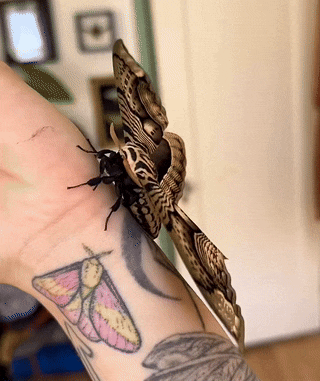
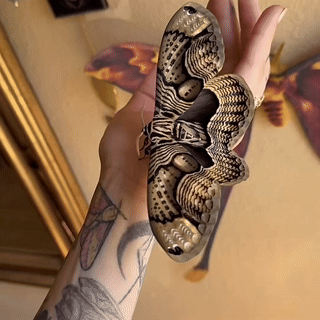
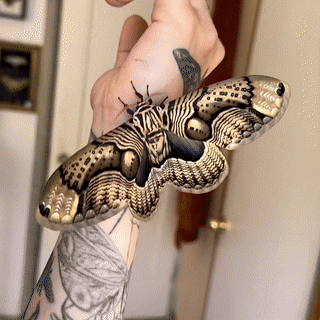
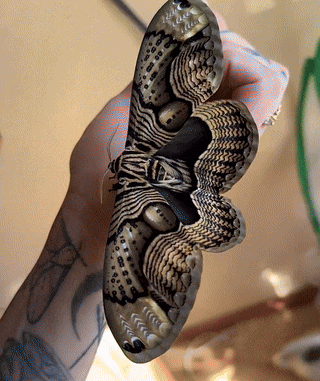
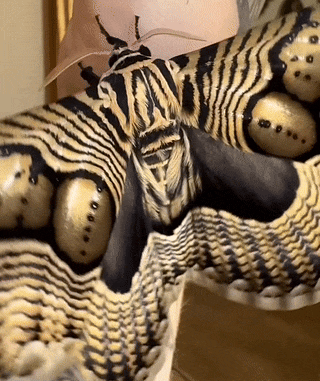
hearsey's owl moth (brahmaea hearseyi) | ofmoth_andflame on ig
The Oriental Blue Clearwing Moth: these moths were regarded as a "lost species" for more than 130 years, until they were finally sighted again in 2013

For more than 130 years, the Oriental blue clearwing moth (Heterosphecia tawonoides) was known only from a single, badly damaged specimen that was collected in Sumatra in 1887. There were no recorded sightings of this species again until 2013, when entomologist Dr. Marta Skowron Volponi unexpectedly found the moths feeding on salt deposits that had accumulated along the riverbanks in Malaysia's lowland rainforest.

These moths were observed by researchers again in 2016 and 2017, and research indicates that the moths are actually bee-mimics, as they mimic the appearance, sound, behavior, and flight patterns of local bees. Their fuzzy, bright blue appearance might seem a little out of place for a bee-mimic, but those features do appear in several different bee species throughout Southeast Asia.
When the moths are in flight, they bear a particularly strong resemblance to the bees of the genus Thyreus (i.e. cuckoo bees, otherwise known as cloak-and-dagger bees), several of which are also bright blue, with banded markings, dark blue wings, fuzzy legs, and smooth, rounded antennae. The physical resemblance is compounded by the acoustic and behavioral mimicry that occurs when the moths are in flight.

Cloak-and-Dagger Bees: the image at the top shows an Indo-Malayan cloak-and-dagger bee (Thyreus novaehollandiae) in a sleeping position, holding itself upright with its mandibles clamped onto a twig, while the image at the bottom shows a Himalayan cloak-and-dagger bee (T. himalayensis) resting in the same position
The moths also engage in "mud-puddling" among the various bees that congregate along the riverbanks; mud-puddling is the process whereby an insect (usually a bee or a butterfly) draws nutrients from the fluids found in puddles, wet sand, decaying plant matter, carrion, animal waste, sweat, tears, and/or blood. According to researchers, the Oriental blue clearwing moth was the only lepidopteran that was seen mud-puddling among the local bees.
Dr. Skowron Volponi commented on the unusual appearance and behavior of these moths:
You think about moths and you envision a grey, hairy insect that is attracted to light. But this species is dramatically different—it is beautiful, shiny blue in sunlight and it comes out during the day; and it is a master of disguise, mimicking bees on multiple levels and even hanging out with them. The Oriental blue clearwing is just two centimeters in size, but there are so many fascinating things about them and so much more we hope to learn.
This species is still incredibly vulnerable, as it faces threats like deforestation, pollution, and climate change. The president of Global Wildlife Conservation, which is an organization that seeks to rediscover "lost species," added:
After learning about this incredible rediscovery, we hope that tourists visiting Taman Negara National Park and picnicking on the riverbanks—the home of these beautiful clearwing moths—will remember to tread lightly and to take their trash out of the park with them. We also recommend that Americans learn about palm oil production, which is one of the primary causes of deforestation in Malaysia.
Sources & More Info:
Phys.org: Bee-Mimicking Clearwing Moth Buzzes Back to Life After 130 Years
Mongabay News: Moth Rediscovered in Malaysia Mimics Appearance and Behavior of Bees to Escape Predators
Journal of Tropical Conservation Science: Lost Species of Bee-Mimicking Clearwing Moth, H. tawonoides, Rediscovered in Peninsular Malaysia's Primary Rainforest
Frontiers in Zoology: Southeast Asian Clearwing Moths Buzz like their Model Bees
Royal Society Publishing: Moving like a Model - mimicry of hymenopteran flight trajectories by clearwing moths of Southeast Asian rainforests
Medium: Rediscovery in a Glint of Blue
re:wild.org: The "Search for Lost Species" Project
__________ /___\ __________
/ { \ / } \
/ ____________ \ /______________\
\ * | * /
______ | ______
| | |
/ /\ \
/ / \ \
|__| |__|


Just doing pink spotted ladybeetle shit

❓️Hercules ❓️
What's that one beetle that has a chainsaw nose you know the one. The little freak whose nose looks like a bread knife what's it called. that one little weirdo
I've been looking for her everywhere and now I'm starting to wonder if she even exists or maybe I just hallucinated a brand new species into existence idk

Gatekeeper ant! Found her in a pool, she's absolutely beautiful

planthopper nymph!!
It's so cute with its tiny dumbass eyes and fuzzy tail it's like a ballerina bug
Now I wanna draw a buglerina

I was bored in class
Tumblr I expect some good PruBela when I wake up or someone is gonna be very upset












